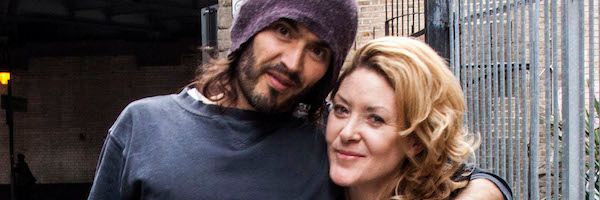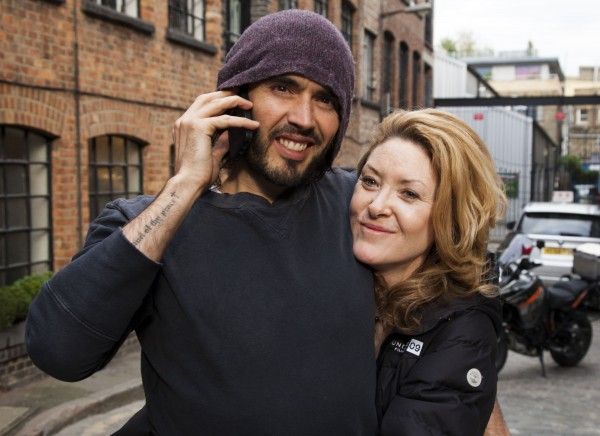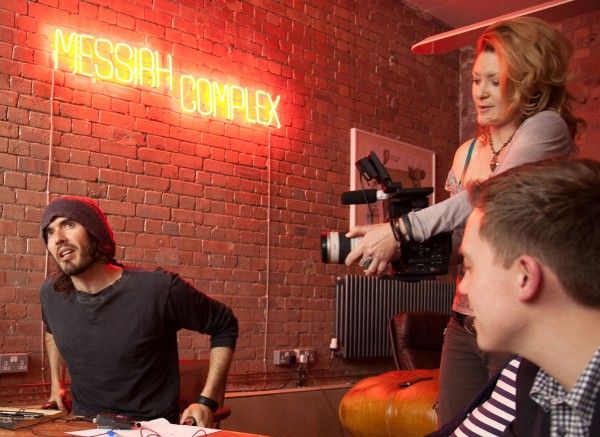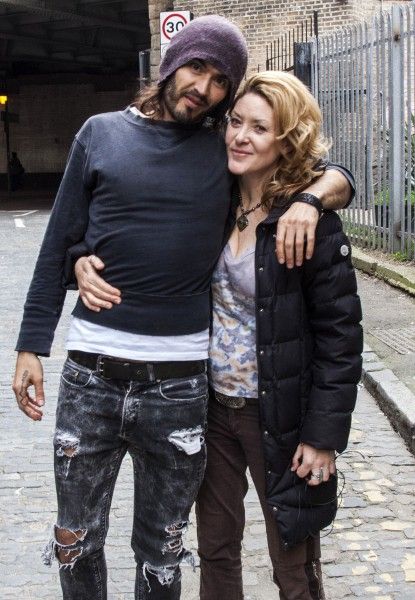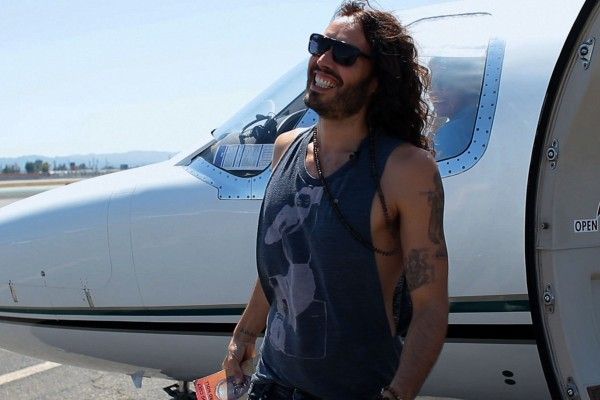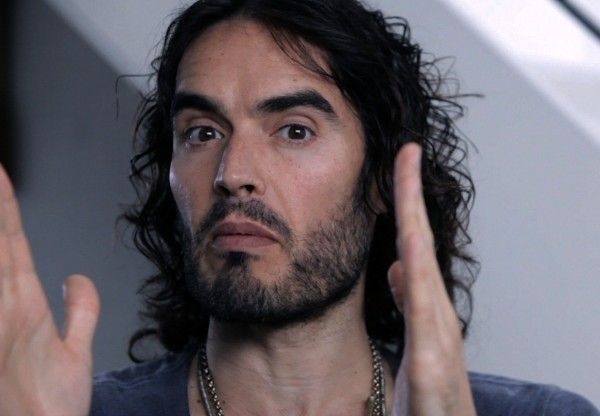The documentary Brand: A Second Coming, from filmmaker Ondi Timoner, follows actor/comedian/activist Russell Brand on his journey from a drug addict seeking fame and fortune to his current and unexpected role as someone looking to disrupt the government and fight for what he believes in, as he calls for revolution. Through interviews with family and friends, his own thoughts, and bits from his stand-up, his courage just might inspire a new generation of activists to realize that there is something more out there.
During this exclusive phone interview with Collider, director/writer/producer Ondi Timoner talked about not really having known anything about Russell Brand prior to meeting him for this film, why she thought his journey could be meaningful to people, what makes him such a polarizing figure, her interest in impossible visionaries, how the film evolved from thousands of hours of footage, the differences from her original director’s cut, moving into scripted projects (she’s developing a film about controversial photographer Robert Mapplethorpe, as well as writing a TV series), doing a doc about her father, and her talk show about documentaries.
Collider: How did this originally come about, and what was it that really ultimately convinced you that there would be a worthwhile movie in all of this?
ONDI TIMONER: I didn’t actually know anything about Russell until I met him. I saw footage of him, but I couldn’t really tell what was so extraordinary about him, at all, from that footage. It was really his magnetic energy and his intelligence in the room that impressed me. But then, I saw the stand-up show he was doing about the messiahs and icons of our time that put something bigger than themselves before their own agenda. He was starting to explore that stuff, and I thought that was an interesting way to look at things. It’s the 15 minutes of fame that we’re after these days versus the everlasting immortal mark that these people who have died for what they believe in have. The role of ego and narcissism in all of that, with Russell’s own life journey to get to a place where people would recognize him and he would be famous and he would live this celebrity dream, he thought that would take away his pain. To actually tell his life story and look at it through his eyes, and also have the comedic element that his insight and intelligence allows, seemed to me to be a good recipe for a film that could be meaningful to people.
Do you feel like people make certain judgements about who Russell Brand is, and then they get the chance to see what he’s really about and it changes their opinion of him?
TIMONER: Yeah, that’s certainly happening with this film. People never realized that Russell had such an agenda and such depth. They just had no idea. They look at this film and they can’t believe it. That happens, time and again. He’s a very polarizing figure. A lot of people think that he’s just out for attention for himself, and a lot of people find him annoying. People have a knee-jerk reaction to a film about him, but I’m not the kind of filmmaker who goes and makes a film about a famous person. My films are all about people you haven’t heard of, and how extraordinary something that they’re doing is. They’re usually about all of us and they’re made for all of us. So, why I made this film was because Russell bought into every myth we’ve ever been sold that would make us happy, but came up empty. I thought that if I could tell his life story, that would be something really meaningful for people to watch.
Are you surprised that someone in his position really had that revelation?
TIMONER: Yeah. He thought fame was going to bring him nirvana. Everybody is told, from the day that they’re born, by every ad, that if you look like that person, you’re famous, and you’re in front of the camera, you’re going to smile and be happy. He did all of the things that we look at as potential solutions. He became a great, successful drug addict. He slept with thousands of women. He became a Hollywood star. He married the biggest pop star in the world. But, he was unhappy with all of that. It didn’t bring him fulfillment. And then, he had the courage to leave and say, “Okay, I’m gonna go back to England and I’m gonna work with ordinary people, like my ex-neighbors, to try to wake people up to the oligarchy we live under. I’m gonna change the world and overthrow the government.” That’s pretty extraordinary behavior. It’s pretty courageous to put himself on the front lines like that. Whether or not it’s motivated, in part, by wanting to be remembered forever, and emulating people like Ghandi or Malcolm X, who cares? He says, “I’m a narcissist, but I’m your narcissist.” Maybe all of the great leaders have been exactly that. What does it take to stand up to the ridicule and doubt of others, and continue on your mission?
There’s something to be said for what I call impossible visionaries, or people who take on the impossible and they act impossibly, along the way. They’ve been ridiculed and doubted, and they’ve come under fire. Here’s a guy who’s been sober for 14 years, but he’s putting himself on the front lines of all of this and making himself vulnerable. People see the film and realize that he’s a human being. He puts a very strong image out there, but of course, he’s affected by this stuff. He’s just put in a box. We, as a society, suffer from putting people like him in boxes. I like to tell the stories of people that step out of line and follow what they believe in because I think that’s where we can be inspired to do that ourselves. This is called Brand: A Second Coming and it challenges people to look at what their second coming could be, after watching it. This is just the story of his second coming. This is him saying, “This didn’t work, so I’m going to go on a different path,” and having the courage to do that.
You must have had a lot of footage from various places to go through for this. How long did it take to cut it all and put this together into the film that we see now?
TIMONER: I had thousands of hours of footage. I’ve been on the film for nearly three years, and I edited everything that existed first. I’m an editor, too, so I worked with a few editors, but I was also editing myself. But then, as I was shooting and editing, simultaneously, Russell went off on tour with The Messiah Complex, never to return again to Los Angeles. He moved to England to overthrow the government, started The Trews, and wrote a book. I had to go back out and shoot and edit some more, so it’s hard to say exactly how long it took. By Christmas of last year, I had personally edited over 3,000 hours, but since then, it’s been a lot more than that. And then, there’s three other editors who worked on the film, as well, for last time as I, but they still worked really hard on it. It was pretty intense.
You clearly knew the approach you wanted to take with this and the affect you wanted it to have, but Russell Brand seems quite unpredictable. How different is the finished film from what you thought you might actually make when you went into it?
TIMONER: It’s very different because of all the things that went down and the things that happened along the way. And then, when I finished the edit for SXSW and he watched it, he had issues with it and asked me to change a lot of things, some of which I did for ethical reasons, and others that I couldn’t do because it would have hurt the film too much. So, it is different from what I made. My director’s cut was different than this, but I think it’s still really strong. It doesn’t violate Russell Brand, in any way. In my opinion, it does not cross any ethical lines and it’s not participating in any transgression on him. I made it with love and admiration and my heart. But at the same time, it does contain really personal and private moments that make him uncomfortable, but that also make him very real and relatable to an audience.
What is your next project going to be about?
TIMONER: I wrote the story of Robert Mapplethorpe, the photographer, who is another cultural lightening rod. I hope to produce and direct that in the spring of the coming year. It’s a scripted film, but it’s based on real events and from over 50 sources. That’s a dream project that I’m casting right now. And then, I also wrote the story of my father, who founded the fastest growing airline in the history of the industry, but then also had a stroke. He founded the airline, Air Florida, the year that I was born, and then his neck was cracked in a massage when I was nine. It’s about the wise and fall of the American dream, in some ways. That’s another dream project of mine that I really hope to do. I’m also writing a television series. So, I’m moving a lot into scripted films, but I’ll always make documentaries. I also host a show called BYOD, or Bring Your Own Doc, on the internet, which is the only talk show about documentaries in the world. It’s been going for four years now, and all of my best friends and colleagues, who are all the warriors of truth in the world that go out and make documentaries, come on the show and talk very frankly, and we show lots of clips. It’s a great resource for anyone who likes documentaries.
Brand: A Second Coming is now in theaters. BYOD (Bring Your Own Doc) is available at www.thelip.tv.

